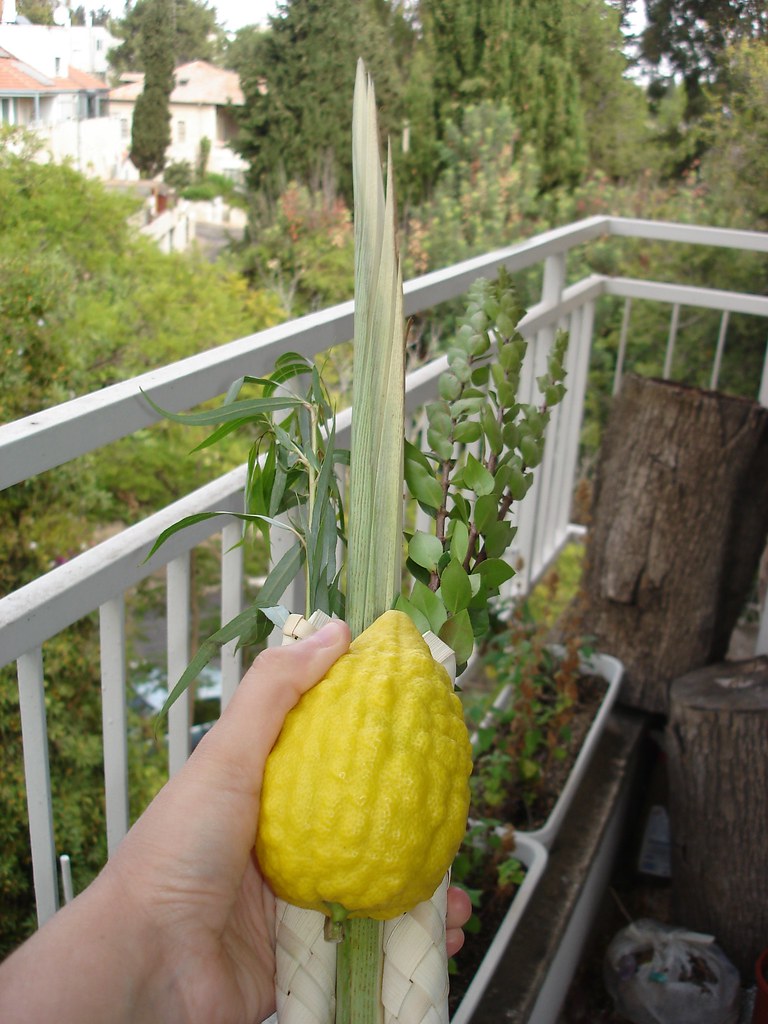There is a well-known tradition that a pregnant woman should bite off the stem of the etrog that had been used for the festival of Sukkot on Hoshana Rabba after the morning services, when the etrog is no longer needed for the rituals of Sukkot. The earliest known text that describes this custom, its rationale, and the teḥinah that is recited in conjunction with it, is this passage in the Ẓe’enah U-Re’enah §86.
| Source (Yiddish) | Translation (English) |
|---|---|
כי טוב עץ למאכל (בראשית ג:ו) — |
The tree was good for eating (Genesis 3:6) — |
אונ׳ עטליכֿי דיא זאגן עש איז איין אתרוג בוים גיוועזן. אונ׳ דרום איז דער מנהג דאש דיא ווייבר נעמן דען אתֿרוג אונ׳ רייסן אויש דיא שטיל אן הושענא רבא. כלומר זיא געבן געלט אין דער צדקה. דען דיא צדקה איז מציל פֿון דער טוט. אונ׳ דש זיא גאט זאל בשירמן מיט איר קינד דש זיא טראגט. דען זאלטן זיא ניט האבן גיגעסין פֿון דען אפפֿיל. דא מעכֿט דיא פֿרויא איר קינד גרינג האבן, אז דיא הען איין איי ליגט און צער. |
Others say that it was an etrog tree and that is why it is the custom for women to tear out the tip of the etrog on Hoshana Rabbah. That is to say, they give money to charity because “charity saves from death,”[1] Find, Proverbs 10:2 and Proverbs 11:4. and also so God should protect the child she is pregnant with. Since she did not eat from the apple, may the woman give birth to her child as easily as a hen lays an egg, without pain. |
אונ׳ דיא פֿרויא זאל רידן, רבונו של עולם דרום ווייל חוה האט גיגעסין פֿון דען אפפֿיל, זאלן מיר ווייבר אלי ליידן אזו אין גרושי צרה צו שטערבן. אונ׳ זאלט איך זיין דער בייא גיוועזן איך העט קיין הנאה דער פֿון גיהאט׃ אזו וואול אז איצונדרט דא האב איך דען אתֿרוג ניט וועלין פסול מאכֿין גאנצי זיבן טאג, דער ווייל ער צו איינר מצוה האט גיקערט. אבר איצונדרט הושענא רבא איז נון דיא מצוה אויז. נאך בין איך ניט געך צו עסין, אונ׳ אזו ווינציג הנאה אלש איך האב פֿון דען שטיל. אזו ווינציג העט איך גיהאט פֿון דען אפפֿיל הנאה, וואז דוא האשט פֿר באטין׃ |
The woman should say, Lord of the universe, because Eve ate the apple, we women must suffer the terrible fate to die in childbirth. Had I been present there, I would not have derived any benefit from it, just as now I did not want to make the etrog ritually unfit. It was used for the fulfillment of a commandment for seven days, but now on Hoshana Rabbah the commandment is ended. I am not quick to eat it, and just as I have little benefit from the tip, so did I have little benefit from the apple that you forbade. |
This is Dr. Morris Faierstein’s transcription and translation of one of the earliest teḥinot found in the earliest surviving edition of the Tsenah u-Re’enah (Basel/Hanau 1622) by Jacob ben Isaac Ashkenazi (1550–1625). (The first three printed editions may be lost to history.) The teḥinah is included in Dr. Faierstein’s article “The Earliest Published Yiddish Tehinnot (1590–1609)” in Hebrew Union College Annual, 2020, Vol. 91 (2020). The transcription of the Yiddish sourcetext is found on page 206 and the English translation is found on page 187. The translation is shared under the libre Open Access license (Creative Commons Attribution) provided for the critical translation of the text in Ze’enah U-Re’enah: A Critical Translation into English (Volume 96 in the series Studia Judaica, ed. Morris M. Faierstein; De Gruyter 2017).
Notes
| 1 | Find, Proverbs 10:2 and Proverbs 11:4. |
|---|

“Teḥinah upon tearing off the pitom of the etrog on Hoshana Rabba, from the Tsenah Ur’enah (1622)” is shared through the Open Siddur Project with a Creative Commons Attribution 4.0 International license.










Leave a Reply